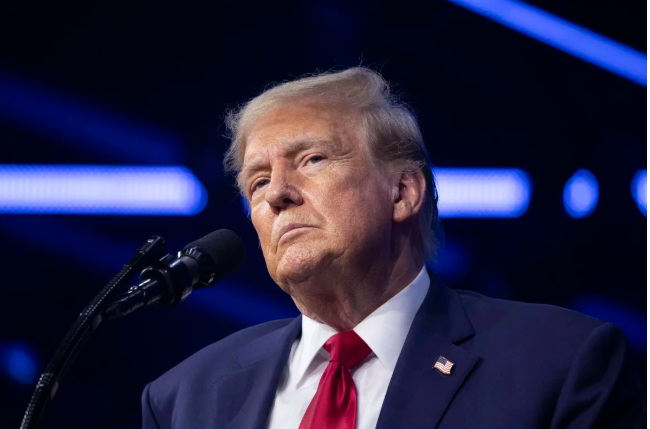 Throughout his presidency and beyond, former President Donald Trump frequently criticized the Democratic Party and its policies. However, many of his statements seem to contradict positions he had either once supported or had implemented during his time in office. This inconsistency has sparked debates over his political stance, with critics pointing out that Trump’s rhetoric often diverged from the reality of his actions and past support for certain policies.
Throughout his presidency and beyond, former President Donald Trump frequently criticized the Democratic Party and its policies. However, many of his statements seem to contradict positions he had either once supported or had implemented during his time in office. This inconsistency has sparked debates over his political stance, with critics pointing out that Trump’s rhetoric often diverged from the reality of his actions and past support for certain policies.
Here are six notable instances where Trump criticized Democrats for positions he had previously endorsed or enacted during his own administration:
Healthcare Reform Trump repeatedly criticized Democrats’ push for a universal healthcare system, particularly the Affordable Care Act (ACA), which he promised to repeal and replace. However, during his time in office, Trump’s administration enacted several policies that resembled aspects of the ACA. For instance, his support for allowing people to stay on their parents’ insurance plans until age 26 and his proposed ideas for a more market-driven health system echoed some of the ACA’s goals, even as he worked to dismantle its core elements.
Immigration Policy Trump’s stance on immigration was one of his most defining issues, and he often accused Democrats of being too lenient and failing to secure the U.S. border. Yet, during his presidency, Trump signed the Deferred Action for Childhood Arrivals (DACA) extension, offering temporary protections to undocumented immigrants brought to the U.S. as children a policy that many Democrats had supported for years. Despite his criticism of DACA, Trump’s administration maintained certain protections for these individuals while simultaneously attacking broader immigration reform.
Trade Deals Trump often criticized Democrats for their trade policies, particularly with China, accusing them of selling out American workers. However, his administration signed deals that closely resembled trade agreements initiated under the Obama administration. One example was his endorsement of the revised North American Free Trade Agreement (NAFTA), which was rebranded as the United States-Mexico-Canada Agreement (USMCA). While Trump hailed it as a victory, the USMCA retained many of the same principles as NAFTA, the trade deal he had previously condemned.
Tax Policy Trump’s tax reform package in 2017 was one of his major legislative achievements, cutting corporate taxes and reducing taxes for individuals. However, he often criticized Democrats for wanting to raise taxes on the wealthy and corporations. Ironically, his own tax cuts benefited wealthy Americans and corporations, resembling policies many Democrats had previously proposed in the form of tax cuts aimed at the middle class and lower-income groups. Despite his rhetoric, his actions aligned more with a blend of both Democratic and Republican tax strategies.
Environmental Protection Trump’s administration rolled back many environmental regulations, arguing that these measures stifled economic growth. Yet, when it came to clean energy investments and environmental protections, Trump often praised energy policies that Democrats had previously supported, such as the expansion of wind and solar energy in certain regions. At times, his criticisms of Democratic policies on climate change seemed at odds with some of his administration’s actions, which acknowledged the importance of clean energy sources even while pulling out of global agreements like the Paris Climate Accord.
Foreign Aid Trump consistently criticized Democrats for being too generous with foreign aid, particularly to countries he viewed as not benefiting American interests. However, under his administration, the U.S. continued to provide substantial foreign aid to certain nations, especially allies like Israel, Egypt, and Afghanistan. Trump’s rhetoric often suggested he would slash foreign aid, yet in practice, he maintained substantial levels of support for strategic allies and global operations, not unlike the positions held by some Democrats in Congress.
These examples highlight the often contradictory nature of Trump’s political messaging, where his criticism of Democrats sometimes mirrored policies he had once supported or implemented. While some of these positions may be framed as compromises or strategic changes, they reflect a broader challenge for Trump: maintaining consistency in his rhetoric versus his record.
For his supporters, these contradictions may be seen as pragmatic decisions aimed at advancing the national interest, regardless of political affiliation. For his detractors, they serve as a reminder that Trump’s rhetoric often did not match his actions, leading to accusations of hypocrisy and inconsistent policy stances.
As Trump continues to dominate political discourse in the U.S., his critics will likely continue to point out these contradictions. Whether his actions align with his criticisms or not, the former president’s impact on American politics remains undeniable, marked by an often unpredictable mix of policy shifts, partisan rhetoric, and divisive rhetoric.

